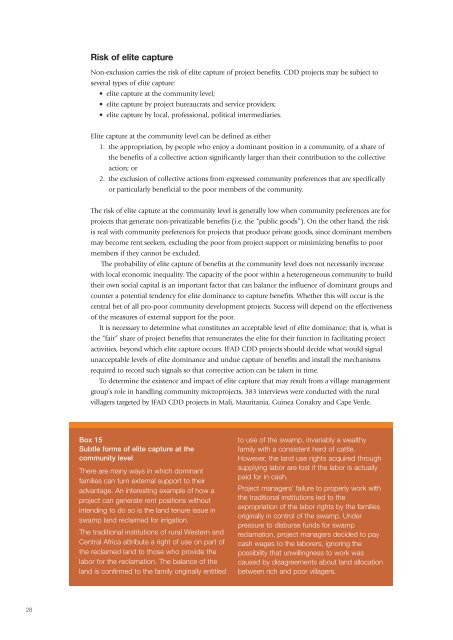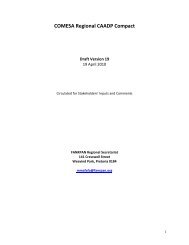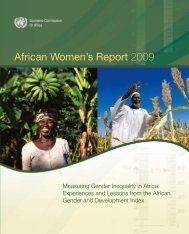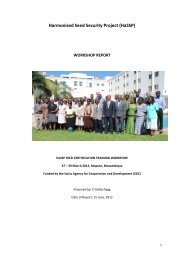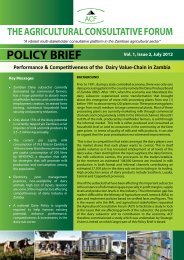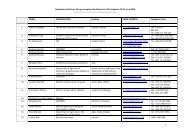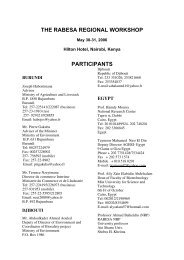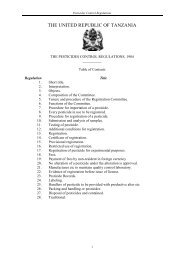Community-driven development decision tools for rural - IFAD
Community-driven development decision tools for rural - IFAD
Community-driven development decision tools for rural - IFAD
- No tags were found...
Create successful ePaper yourself
Turn your PDF publications into a flip-book with our unique Google optimized e-Paper software.
Risk of elite captureNon-exclusion carries the risk of elite capture of project benefits. CDD projects may be subject toseveral types of elite capture:• elite capture at the community level;• elite capture by project bureaucrats and service providers;• elite capture by local, professional, political intermediaries.Elite capture at the community level can be defined as either1. the appropriation, by people who enjoy a dominant position in a community, of a share ofthe benefits of a collective action significantly larger than their contribution to the collectiveaction; or2. the exclusion of collective actions from expressed community preferences that are specificallyor particularly beneficial to the poor members of the community.The risk of elite capture at the community level is generally low when community preferences are <strong>for</strong>projects that generate non-privatizable benefits (i.e. the “public goods”). On the other hand, the riskis real with community preferences <strong>for</strong> projects that produce private goods, since dominant membersmay become rent seekers, excluding the poor from project support or minimizing benefits to poormembers if they cannot be excluded.The probability of elite capture of benefits at the community level does not necessarily increasewith local economic inequality. The capacity of the poor within a heterogeneous community to buildtheir own social capital is an important factor that can balance the influence of dominant groups andcounter a potential tendency <strong>for</strong> elite dominance to capture benefits. Whether this will occur is thecentral bet of all pro-poor community <strong>development</strong> projects. Success will depend on the effectivenessof the measures of external support <strong>for</strong> the poor.It is necessary to determine what constitutes an acceptable level of elite dominance; that is, what isthe “fair” share of project benefits that remunerates the elite <strong>for</strong> their function in facilitating projectactivities, beyond which elite capture occurs. <strong>IFAD</strong> CDD projects should decide what would signalunacceptable levels of elite dominance and undue capture of benefits and install the mechanismsrequired to record such signals so that corrective action can be taken in time.To determine the existence and impact of elite capture that may result from a village managementgroup’s role in handling community microprojects, 383 interviews were conducted with the <strong>rural</strong>villagers targeted by <strong>IFAD</strong> CDD projects in Mali, Mauritania, Guinea Conakry and Cape Verde.Box 15Subtle <strong>for</strong>ms of elite capture at thecommunity levelThere are many ways in which dominantfamilies can turn external support to theiradvantage. An interesting example of how aproject can generate rent positions withoutintending to do so is the land tenure issue inswamp land reclaimed <strong>for</strong> irrigation.The traditional institutions of <strong>rural</strong> Western andCentral Africa attribute a right of use on part ofthe reclaimed land to those who provide thelabor <strong>for</strong> the reclamation. The balance of theland is confirmed to the family originally entitledto use of the swamp, invariably a wealthyfamily with a consistent herd of cattle.However, the land use rights acquired throughsupplying labor are lost if the labor is actuallypaid <strong>for</strong> in cash.Project managers’ failure to properly work withthe traditional institutions led to theexpropriation of the labor rights by the familiesoriginally in control of the swamp. Underpressure to disburse funds <strong>for</strong> swampreclamation, project managers decided to paycash wages to the laborers, ignoring thepossibility that unwillingness to work wascaused by disagreements about land allocationbetween rich and poor villagers.28


